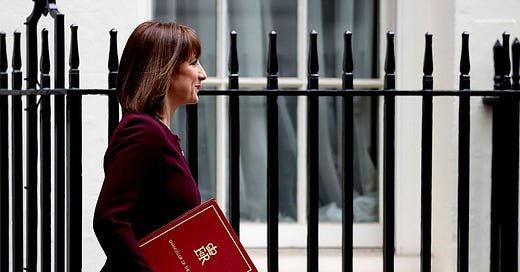Ever since their 1992 election loss Labour strategists have lived in fear of losing economic credibility. They believe, with some justification, that they are held to a higher standard than the Conservatives and so have little choice but to constantly emphasise prudence and parsimony.
The party’s pre-election pledge not to raise the four main taxes (income, national insurance contributions, VAT and corporation), was done purely to avoid a repeat of 1992. I thought it was a mistake then and still do – because the Tories had so thoroughly trashed their own economic reputation that a John Major-style comeback was never plausible.
Labour also pledged, in the run up to the election, to stick within fiscal rules (albeit avoiding precise definition). This was aimed more at the media than any other audience. Because of what happened to Liz Truss, abiding by OBR rules had become a Westminster shorthand for economic responsibility, even though the lack of a forecast was not the reason markets reacted so badly to Kwarteng’s “mini-budget”.1
There was always a tension here, as there was never any chance that Labour could stick within nonsensical Tory spending plans. So either taxes or borrowing, or both, were going to have to increase. Bond traders assumed, correctly, that the government would choose to tax more so were relatively sanguine in advance of last autumn’s budget.
But as I noted at the time, having constrained themselves with these pledges, Labour were forced to use up all their room for manoeuvre at once. Higher national insurance for employers was the only large tax they could increase while, even dubiously, claiming to have met their pledge. Tweaks to the fiscal rules created more room for borrowing, but that could only be done once.
So, as expected, this week’s Spring Statement involved scrabbling around trying to restore the meagre “headroom” in the OBR’s forecast through spending reductions alone. Further cuts to most departments were pencilled in for the second half of the Parliament. Welfare was used as the balancing variable – new cuts to disability benefits were being added until the last minute to hit the exact figure required.
To state the obvious this is not a good way to make policy, especially one that affects the finances of vulnerable people. This particular mess could have been avoided by the simple expedient of moving to a single forecast a year to fit with Rachel Reeves’ desire for a single fiscal event. But the problem is probably going to reoccur in the autumn anyway given the high likelihood of a further downgrade in the public finances. Not only will we get the negative impact of Trump tariffs added to that forecast but the OBR will need to reassess productivity assumptions underpinning what now look like very optimistic future growth projections.
All of which means that the tension between the various pledges is not going to be sustainable. The widespread expectation is that Labour will sacrifice some of their remaining political credibility, by putting up taxes again, rather than their fiscal credibility by breaking rules. But this raises two questions I’ll be addressing in the rest of this post. First, if the government know they are going to have to do this, then why wait? Secondly, what is the cost to fiscal credibility of waiting? Or to put it another way what is the value of a process no-one believes?
Keep reading with a 7-day free trial
Subscribe to Comment is Freed to keep reading this post and get 7 days of free access to the full post archives.




